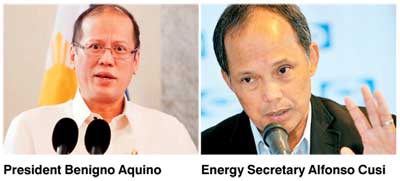Saturday Feb 21, 2026
Saturday Feb 21, 2026
Tuesday, 26 July 2016 00:01 - - {{hitsCtrl.values.hits}}
MANILA (Reuters): The Philippines will retain coal as a core part of its electricity generation mix due to its dependability, though it will seek to boost the use of cleaner fuels and renewable energy, the country’s energy minister said last week.
The Southeast Asian nation, with a population of more than 100 million people and one of the world’s fastest growing economies, aims to double its power generation capacity by 2030 to avoid a return to the frequent blackouts suffered during the 1990s.
“Coal is the more dependable, the more reliable source for base load,” Energy Secretary Alfonso Cusi told his first media briefing since the administration of President Rodrigo Duterte took office last week.
“As a developing country we cannot afford not to have coal,” added Cusi.
The previous administration made a belated push for clean energy and renewables after approving coal-fired power plant projects that  could expand the fossil fuel’s share in the mix to more than 50% from more than 30% currently.
could expand the fossil fuel’s share in the mix to more than 50% from more than 30% currently.
Just weeks before he stepped down on 30 June, President Benigno Aquino ordered a review of the government’s energy policy within six months, seen by environmentalists as a major step to steer the country away from coal and toward renewables.
Under Aquino, the Department of Energy was pushing for a 30:30:30 mix for renewables, coal and natural gas, with the remaining 10% allocated for alternative energy including nuclear.
But capping the use of cheap coal is likely to be tough in a country where electricity costs are among the highest in Asia.
Proponents of solar energy have launched a campaign aiming to make the Philippines use only renewables by 2030, by halving the cost of solar so that it can compete against fossil fuels without subsidies.
“We have to find a happy balance. We cannot afford to rely solely on renewables,” Cusi said, adding that his team would try to complete a review to establish a new energy policy in 30 days.
Nuclear power is also an option and the government would encourage investment in liquefied natural gas with the expected depletion of the country’s Malampaya natural gas field by 2024, he said.
The Philippines relies on imported coal, mainly from Indonesia, to fuel about a dozen power plants with total capacity of around 6,000 megawatts. Annual coal imports could rise 16% over the next 10 years to 17.6 million tons, according to government projections.